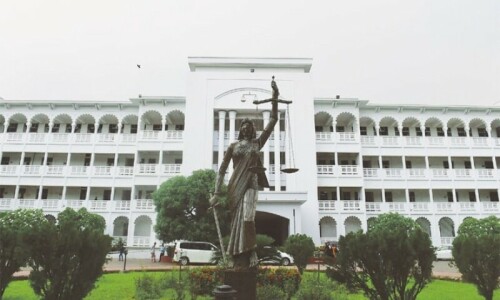Bangladesh’s new authorities on Wednesday opened an investigation into hundreds of enforced disappearances by security forces during the rule of ousted premier Sheikh Hasina, the government said.
It includes the notorious Rapid Action Battalion (RAB) paramilitary force, accused of numerous rights abuses, and which was sanctioned by the United States for its role in extrajudicial killings and enforced disappearances.
Human Rights Watch last year said security forces had committed “over 600 enforced disappearances” since Hasina came to power in 2009, and nearly 100 remain unaccounted for.
Many of those detained were from Hasina’s rivals, the Bangladesh Nationalist Party and Jamaat-e-Islami, the country’s largest Islamist party.
Hasina’s government consistently denied the allegations, claiming some of those reported missing had drowned in the Mediterranean while trying to reach Europe.
Hasina fled to India by helicopter on August 5 after weeks of student-led protests forced her to quit, ending her iron-fisted 15-year rule.
‘Disappearances and torture’
The five-member committee, headed by retired high court judge Moyeenul Islam Chowdhury, will also investigate other paramilitary police units, including the Border Guard Bangladesh (BGB), a government order late Tuesday said.
The UN rights office says both the RAB and BGB forces have “records of serious human rights violations, including enforced disappearances and torture and ill-treatment”.
The commission, ordered to begin work by the interim government led by Nobel Peace Prize laureate Muhammad Yunus, has 45 working days to submit its report.
Sanjida Islam Tulee, a coordinator of a group campaigning for the release of people detained under Hasina, welcomed the commission.
“Most importantly, the report needs to be published fully and no information is kept hidden”, Tulee told AFP, who heads the group called Mayer Daak, meaning “The Call of the Mothers”.
Tulee, who along with those who searching for missing relatives met earlier this month with Yunus asking for action, said she wanted the commission to listen to every family without discrimination.
She said they wanted the return of those missing, and for those responsible to face justice.
More than 600 people were killed in the weeks leading up to Hasina’s ouster, according to the United Nations rights team’s preliminary report, suggesting the toll was “likely an underestimate”.
The day after she fled, families gathered outside a military intelligence force building in Dhaka waiting desperately for their relatives.
But only a handful have been confirmed as released.













































